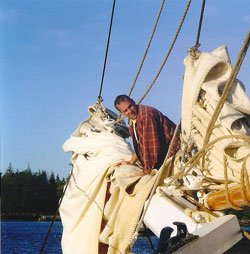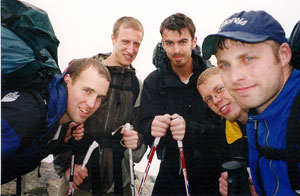Brad Glick
bsglick@yahoo.com
 Editor’s Note: Each year Franconia Conference and Eastern District Conference award Clayton Kratz scholarships for emerging leaders who are preparing for roles in church leadership. This year Intersections invited Brad to tell his story and sojourn in pursuing a vocation at the intersection of church leadership and law school.
Editor’s Note: Each year Franconia Conference and Eastern District Conference award Clayton Kratz scholarships for emerging leaders who are preparing for roles in church leadership. This year Intersections invited Brad to tell his story and sojourn in pursuing a vocation at the intersection of church leadership and law school.
In my application to Emory Law School I wrote:
Within the Mennonite Church there tend to be two world views. The first more traditional view believes the responsibility of the person is to remain within his community, to prosper at a business, to support his family, and to be “the quiet in the land.†The second, more progressive view believes that as a church with a foundation of peace, justice and nonviolence, the person and the community have an obligation to engage the world in both voice and action.
Because of that obligation I decided to pursue joint J.D. (Law) and Masters of Theological Studies degrees at Emory University in Atlanta.
Looking back at my life, two places stand out as “home;†Lansdale, PA and Spruce Lake Retreat. My father, Jesse Glick, was Franconia Conference’s youth minister from 1976 to 1988. Following this my family moved to Elkhart, IN, and after two Indiana summers I decided to work at Spruce Lake Wilderness Camp as a counselor for what would be the first of four summers and become a career.
After graduating from Eastern Mennonite University as a Camping, Recreation, Outdoor Ministries major, I spent three years working with juvenile delinquents with Eckerd Youth Alternatives, an alternative wilderness program in New Hampshire. In 1999, to recoup from working and living with delinquents for 24 hours a day/six days a week, I worked as deckhand on a schooner off the coast of Maine. In 2000 I was privileged to come back to Spruce Lake Retreat full-time as the Expedition and Outpost Manager/Outdoor Education Teacher.
 I loved my six years at Spruce Lake. Solidifying the foundation of the Expeditions program, planning trips, leading an exceptional staff, and developing relationships with parents and campers were tremendous experiences. During this time, I was led to pursue a joint law and theology degree. As I kept in touch with a few of the delinquent youth from New Hampshire and witnessed similar experiences at Spruce Lake, I became upset by the breakdowns in the school, welfare, and court systems of the state. I saw good kids who had suffered tremendous abuse, yet had a real inner strength and desire to change, floundering without any support from their families, communities, or schools. While some of these kids were not in the court system yet, circumstances were harming and inhibiting their actual and potential lives.
I loved my six years at Spruce Lake. Solidifying the foundation of the Expeditions program, planning trips, leading an exceptional staff, and developing relationships with parents and campers were tremendous experiences. During this time, I was led to pursue a joint law and theology degree. As I kept in touch with a few of the delinquent youth from New Hampshire and witnessed similar experiences at Spruce Lake, I became upset by the breakdowns in the school, welfare, and court systems of the state. I saw good kids who had suffered tremendous abuse, yet had a real inner strength and desire to change, floundering without any support from their families, communities, or schools. While some of these kids were not in the court system yet, circumstances were harming and inhibiting their actual and potential lives.
Christian ethicist Beverly Harrison states that children embody the visions and dreams of their culture. In a recent sermon the preacher described our current culture as an individualistic, therapeutic, militaristic, consumer society.
To truly help children and youth, a two-pronged approach is required. First, the inadequate support systems of the courts, schools, and welfare must be improved through legislation, program development, and the adoption of a restorative justice approach to criminal offenses, each necessitating involvement in the political world. Second, the church must counteract the toxic elements of our culture. This cannot be accomplished merely be creating separate Christian cultures, but by purposefully acting in the everyday lives of the persons around us to show by example a life lived by different principles and beliefs.
Mennonites have a prime opportunity to provide vision and leadership in each area. I was suprised in coming to Candler School of Theology, (a United Methodist seminary) to discover how much people like Mennonites/Anabaptists, or at least our theology. As persons like Jim Wallis, Stanley Hauerwas, and Brian McLaren are offering an alternate vision of what it means to be a relevant Christian in our world, many people are finding Anabaptist theology to be a clear articulation of these beliefs and principles.
Emory Law School’s newly adopted vision is to develop servant leadership. Enough persons in the world are concluding that leadership through coercion and domination is neither healthy for those being led, nor the leaders themselves. Our 500 year tradition of servant leadership in the Mennonite church is an opportunity and an obligation to the world to demonstrate both in voice and action an alternative life based on principles of community, peace, justice, and non-violence.
Brad Glick is in his second year of a four year program at Emory Law School and Candler School of Theology in Atlanta, GA, pursuing a vocation to connect theology and the law into transformative leadership.
2006 Clayton Kratz Award Recipients
Marta Castillo: Marta is pursuing a Certificate of Christian Leadership in online Theological Studies from Eastern Mennonite University in anticipation of entering pastoral ministry. She is a member of Nueva Vida Norristown New Life.
William Eberly: William is pursuing a Master of Divinity at Eastern Mennonite Seminary, VA, in anticipation of becoming an associate pastor or member of a pastoral team. He is a member of Eastern District’s Zion Mennonite Church.
John Michael (Mike) Metzler: Mike is pursuing a Master of Divinity at Eastern Mennonite Seminary, VA, in anticipation of entering the pastorate and possibly church planting. He is a member of Towamencin Mennonite Church.
Tim Moyer: Tim is pursuing a Master of Divinity at Eastern Mennonite Seminary, VA, in anticipation of entering the pastorate. He is a member of Towamencin Mennonite Church.
Yvonne Platts: Yvonne is pursuing a Master of Arts in Urban Studies with a concentration in Community Development at Eastern University’s School for Social Change and cites 2 Corinthians 5:18 as her inspiration for ministry. She is a member of Nueva Vida Norristown New Life and a member of PUMP (Philadelphia Urban Ministry Partnership).
Maria Joy Rodrigez: Maria is pursuing a Master of Arts in Counseling at Eastern Mennonite University, VA, in pursuit of counseling in a church related setting. She is a member of Franconia Mennonite Church.
Susan Slozer: Susan is pursuing a Master of Arts in Counseling at Biblical Seminary, PA, and cites 2 Corinthian 5 as the inspiration for her ministry pursuit in reconciliation and emotional healing. She is a member of Perkiomenville Mennonite Church.
The opinions expressed in articles posted on Mosaic’s website are those of the author and may not reflect the official policy of Mosaic Conference. Mosaic is a large conference, crossing ethnicities, geographies, generations, theologies, and politics. Each person can only speak for themselves; no one can represent “the conference.” May God give us the grace to hear what the Spirit is speaking to us through people with whom we disagree and the humility and courage to love one another even when those disagreements can’t be bridged.
